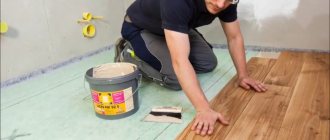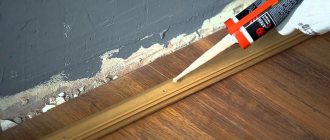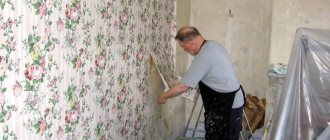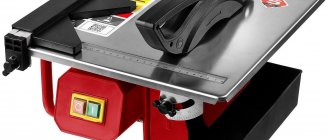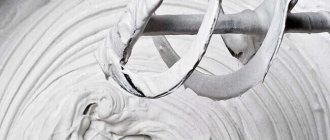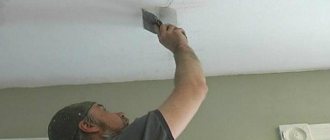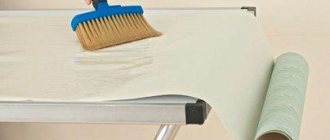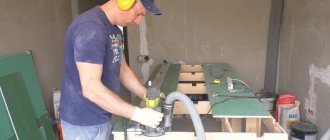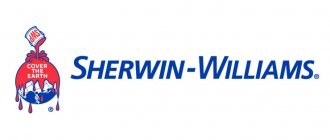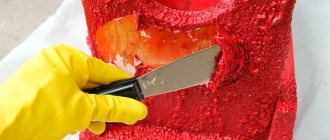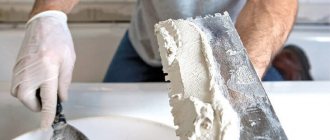| Place | Name | Characteristics in the rating |
| Best all-purpose tile adhesive |
| 1 | Litokol Litoflex K80 | The choice of professionals |
| 2 | Volma Ceramics | Best price |
| 3 | Bergauf Keramik Pro | High seam elasticity |
| The best reinforced tile adhesive |
| 1 | Ceresit CM 17 Super Flex | Resistance to deformation |
| 2 | Perfecta Holder | Fiber reinforced |
| 3 | Unis Plus | The most popular tile adhesive |
| The best moisture-resistant tile adhesive |
| 1 | Knauf Fliesen | The most convenient glue to use |
| 2 | Ceresit SM 11 Plus | Better moisture resistance |
| 3 | Founds Maxiplix AC17 W | Resistant to high temperatures |
| The best tile adhesive for mosaic and marble |
| 1 | Ceresit SM 115 | Perfect white color |
| 2 | GLIMS WhiteFix | The best choice for laying cladding on top |
| 3 | Mapei Kerabond T | Heavy Mosaic Adhesive |
| The best tile adhesive for exterior use |
| 1 | Weber Ultra Fix Winter | The most frost-resistant glue |
| 2 | Rusean Fixator 25 kg | The optimal choice for cladding complex surfaces |
| 3 | MKU MS5 25 | Best price |
Comparison table of characteristics
The summary table contains the main parameters
| Name | Adhesion to concrete, MPa | Layer thickness, mm | Frost resistance | Consumption, kg per sq.m. |
| KNAUF Fliesen Plus | 0,8 | from 2 to 6 | F75 | from 1.7 to 3.7 |
| Ceresit CM 11 PRO | 0,8 | from 2 to 15 | F50 | from 1.2 to 4.2 |
| KNAUF Flex | 1 | from 2 to 6 | F75 | from 2.2 to 2.9 |
| Unis Plus GOLD | 1,25 | from 2 to 15 | F100 | from 1.25 to 1.3 |
| Unis 2000 | 1,1 | from 2 to 15 | F35 | from 1.25 to 3.5 |
| Litokol Litoelastic EVO | 2 | from 2 to 10 | F5 | from 1.5 to 5 |
| Weber Vetonit Profi Plus | 1,4 | from 1 to 15 | F150 | from 1.3 to 13.1 |
| Perfecta Multifix | 1,2 | from 2 to 6 | F50 | from 1.3 |
Briefly about the main thing
Porcelain tiles are heavy and hard, high-density tiles for cladding walls, floors and bases on the outside of a building.
Mechanical stability, high adhesion and compatibility with specific operating conditions are important for tile adhesive.
There is a classification of compositions for laying porcelain stoneware according to composition, functionality, and resistance to certain conditions.
The composition differs between glues based on cement, epoxy resin, dispersion and liquid nails.
In terms of functionality, leveling compounds are distinguished, thick-layered for large-format tiles, fast-hardening, enhanced in strength and adhesion, elastic for use in conjunction with built-in heating systems, highly elastic for conditions with increased mechanical load.
In terms of durability, options are considered: moisture-resistant for outdoor use and wet rooms or pools with fountains, heat-resistant for fireplaces with stoves, frost-resistant for outdoor use.
Separately, universal adhesive options are considered, which have more restrictions on use than highly specialized ones.
The leaders among manufacturers of adhesives for porcelain tiles are Ceresit, Knauf, Litokol and Weber Vetonit.
Ratings 0
Which tile adhesive is better to buy
Each glue has an individual composition and quality. Before choosing a product, you need to familiarize yourself with its characteristics and intended purpose. From the entire rating, there are several models of the adhesive mixture that fully cope with their responsibilities:
- Knauf Fliesen Plus is a universal product for all types of surfaces;
- CM 17 Super Flex – adhesive composition for exterior use;
- Sopro 450 – tile mixture for the bathroom;
- Glims RealFix – composition for heated floors;
- Unis Granite is a tile composition for porcelain stoneware.
The list of the best dry mixtures allows you to choose a product option, ensuring comfortable work and a favorable result. Before purchasing, it is advisable to consult with a specialist.
The best tile adhesive for bathrooms and other wet areas
Ceresit CM 11 Plus
A waterproof composition used for installation of any mineral tiles during interior and exterior work on non-deforming bases. With the addition of a compatible elasticizer to the composition, it becomes possible to use it on waterproofing elastic bases and heated screeds.
This option is especially popular when arranging swimming pools and other surfaces that often come into contact with water.
Knauf Fliesen
Suitable for working with ceramic tiles with a water absorption level of at least 3%. Designed for finishing work on walls and floors in conditions of constant humidity. The high and immediate adhesion of the material to the tile makes installation easier, as it prevents it from slipping during work.
The mixture can only be applied to a flat, non-deformable base, such as concrete, cement, plasterboard or plaster.
Litokol Litoflex K80
Tile adhesive containing synthetic resins and chemical additives, which has high elasticity, adhesion and good ductility. High water-holding capacity allows this composition to be used wherever there is moisture and evaporation. It reliably fixes the masonry and retains its properties in such difficult operating conditions for many years.
It fits on all types of bases and is used to install any, even heavy tiles from any material.
Ceresit SM 9 Plus
Used for working with tiles with a water absorption level of 3%. Provides good adhesion of materials both on the floor and on the walls. It is only suitable for interior work. The size of the tile should not be more than 30 cm x 30 cm. Good composition and dense, viscous texture spreads well on the wall and ensures strong adhesion of surfaces.
Compatible with high-hardness mineral bases, i.e. concrete, cement screeds and plasters. Will last a long time in rooms with high humidity levels and constant contact with steam and water.
Weber Vetonit Optima
Just like the previous option, it is suitable for indoor use only. Well suited for tiling both horizontal and vertical surfaces with mosaics and tiles. Used for cladding walls and floors in the bathroom or kitchen. It hardens evenly and has a strong adhesion, making installation easier.
It is recommended to work with such adhesive only on concrete, brick or cement bases that have passed the shrinkage stage, otherwise the tile adhesive will not be able to withstand deformation and the tile will fall off.
Litokol Litoplus K47
This is a good, reliable and moisture-resistant composition without asbestos. It is also noteworthy that the diluted composition can be effective for 8 hours. It is chosen when carrying out tiling work in saunas, swimming pools, bathtubs and showers for public use. When laying, the glue does not spread over the wall, so the cladding process can be carried out from top to bottom without the use of supports. Suitable for interior work only.
It can be laid on brick walls, cement screeds, concrete blocks and various plasters after pre-treatment with special primers. The base for installation must be level, so before work it is better to level the surface with special compounds.
Litokol Litolight K16
Tile adhesive with improved properties and good adhesive characteristics. Used for porcelain stoneware, clinker, tiles and natural stone. Ideal for cladding indoors and outdoors. Its ability to resist water and its evaporation allows it to be used in any place where there is constant contact with moisture.
Suitable for all types of substrates. It can be applied to drywall, concrete, cement, plaster, old ceramic coating and various screeds. Before applying to porous structures, a primer must be applied.
Knauf K4
KNAUF K4
Glue is manufactured in Germany and is considered universal. Main characteristics of Knauf K4:
- Withstands temperature ranges from -20°C to + 80°C.
- The optimal temperature for working with it is +5°C – +25°C.
- Work correction time is 10 minutes.
- Resistant to loads: the surface of the laid tiles can be loaded after just 24 hours.
- Application. The adhesive is universal, suitable for cladding balconies, facades, indoor floors and many other works.
German quality remains at its best, even when it is frost-resistant glue. It has long been in demand among domestic consumers.
Tips for installing porcelain tiles
Porcelain tiles can be glued from any place, but it is still recommended to lay solid elements rather than cut ones. Lines must be drawn to delimit the places where they intersect. The surface will need to be primed before gluing. If preparation was made in the form of dividing lines, then gluing should begin from the nearest intersection. If a quick-drying adhesive is used, the maximum amount that can be mixed before starting work should cover at least one square meter of tile. This is done in order to avoid rapid drying of the unused mixture. Also, upon completion of installation, it is advisable to level the resulting seams with the general surface. At the same time, you can trim the tiles, removing any excess.
Glue consumption
Most manufacturers indicate approximate consumption figures directly in the instructions for the composition or on the packaging.
IMPORTANT! It is always worth remembering that the indicators indicated by the manufacturer are highly averaged!
Glue consumption will depend on a number of significant conditions, such as:
- Type of glue - there are liquid and thick samples, which differ in the degree of consumption. For cement variations, when diluted with water, the consumption can be from one to two kilograms per square meter, which is quite economical.
- Type of tile - porcelain stoneware absorbs the composition the least, glazed tiles can absorb a little more, and the leader in adhesive absorption will be tiles of the “cotto” type.
- The surface for installation - optimally it should be clean and smooth, then it will not require a lot of glue. However, the larger the surface has pores, the more adhesive it will need, because the degree of absorption of the base will increase.
- Weather conditions - the optimal operating temperature for installation is considered to be between +18 and +25 degrees Celsius. If the temperature exceeds this indicator, you will have to make a little more mixture, since the moisture will evaporate faster (applies to aqueous solutions). Temperatures below zero degrees should not be considered at all - at them the glue loses its adhesive properties.
- The skill of the layer - experience, the laying technology used, the spatula used, and the thickness of the applied layer are more important here. All these parameters have a strong influence on consumption.
Bergauf Keramik Termo
Volume : 25 kg.
Price : 256 rub.
From time to time we hear that you have to pay for quality. Is it so? Bergauf Keramik Termo glue beats similar products in price, but does not lose in quality. Buyers give this glue serious ratings (5 stars out of 5), which means it’s worth it!
The adhesive is intended for laying tiles on heated floors, fireplaces and stoves. Bergauf Keramik Termo contains mineral additives that can withstand high temperatures and help the tiles adhere securely to the glued surface.
For reference: when working with glue, the surface must be processed perfectly: without cracks or chips. The glue must be applied in a thin layer of 3-5 mm. Do not heat the surface for at least 3 days. After 3 days, use the stove, fireplace or underfloor heating as usual.
